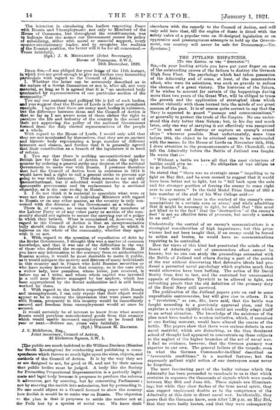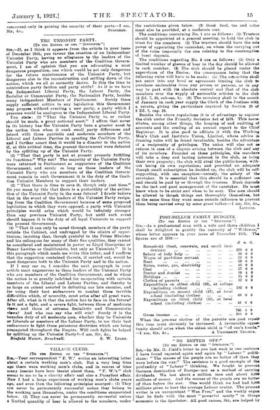THE JUTLAND DISPATCHES.
.tro roe -Eerroa or -setz " Seraretort."1 Sut,--In your leading article you have put your finger on one of -the outstanding causes of the failure to destroy the German High Seas Fleet. The psychology which had taken possession of the Admiralty and of some, •at least, of the gommanders afloat, who were its selections, was such as -gravely to reduce the chances of a great victory. The historian of the future, if he wishes to account-for certain of the happenings during more than two years of the. Great War, will be obliged to trace the -growth and the application .of strategical ideas which • conflict violently with those burned into the minds of our great seamen. of the past. It is of course quite correct to say that the Navy is expected -to guard " passage and communicatiens;" or generally to. protect the trade of the Empire. No one under- - stood this duty better than Nelson j •but, in %his day and much later, only one way of carrying it out effectively was• recognized —" to seek out and destroy or capture an enemy's armed ships " wherever possible. Most unfortunately, some time before 1914, the object to be attained came to be confounded with the means. In the House of Lords on November 15th, 1916, I drew attention to the-pronouncements of Mr. Churchill, who left the -Admiralty before the Battle of Jutland was fought. He wrote that :-
" Without a battle we have all that the most victorious of
battles could give -us. . . No obligation of war obliges us to go further," &c.
He -stated that " there was no strategic cause " impelling us to fight on May 31st, and he even seemed' to suggest that it would have been better not to fight,- but to "fall back upon the safe and far stronger position of forcing the enemy to come right over to our coasts." In the Gold Medal Prize Essay of 1913 a late member of the staff of his War College said :- " The question at issue is the -control of the enemy's WM- munioations in a certain area or areas,' and while admitting that it might be necessary to fight, he added that ` this must not blind us to the fact' that the `destruction' of the enemy's -fleet is not an effective -form of pressure, but merely a means to an end.' "
Undoubtedly the control of an enemy's communications is a strategical consideration of high importance; but this prize- winner had not been taught that, if an enemy could be forced to action and beaten, he would have no communications requiring to be controlled.
How far views of this kind had penetrated the minds of the Board of Admiralty and of commanders afloat cannot be known; but no one can study the proceedings connected with the Battle of Jutland and others during a part of the period of the war without discovering that defensive ideals had pro- duced a perverted naval psychology which explains much that would otherwise have been baffling. The action of Sir David Beatty from first to last, and the sustained but unsuccessful appeals of Commodore Tyrwhitt to be allowed to fight, are refreshing proofs that the old definition of the primary duty of the Royal Navy still survived.
The publication of the Jutland papers puts an end to some unprofitable controversies, but will give rise to others. It is a " revelation," as you, Sir, have said, that the battle was fought according to a previously approved plan, and this explains a certain rigidity which could not readily adapt.itself to an actual situation. The knowledge of the existence of the plan must have tended to weaken initiative, which, if exercised at one fleeting moment, would -have altered the course of the battle. The papers show that there were serious defects in our naval materiel, which are disturbing, as the then -dothinatit school of thought had appeared to concentrate on these subjects to the neglect of the higher branches of the art of naval war. I find no evidence, however, that the German -gunnery was superior to our own. The general failure of the torpedo, even in what the German Commander-in-Chief described -as "favourable conditions," is a marked feature; but the supremely gallant night action of our destroyers must never be forgotten.
The most fascinating part of the bulky volume which the Admiralty has been persuaded to vouchsafe to us is that which contains in sequence the thousands of signals which were made between May 30th and June 6th. These signals are illuminat- ing; but while they show flashes of the true naval spirit, they also suggest unpleasant doubts as to the competence of the Admiralty at this date to direct naval war. Incidentally, they prove that the Germans knew, soon after 730 p.m. on May 31st, that they were badly beaten, and that they were subsequently
concerned:only in gaining' the security of -their perts.—I am,











































 Previous page
Previous page